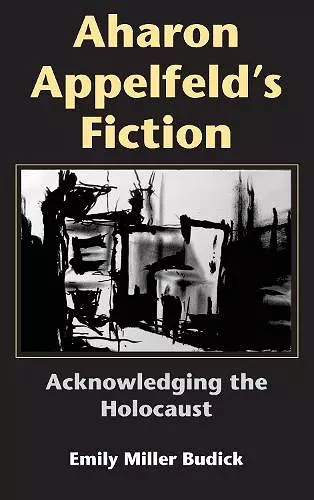Aharon Appelfeld's Fiction
Acknowledging the Holocaust
Format:Hardback
Publisher:Indiana University Press
Published:17th Jan '05
Currently unavailable, and unfortunately no date known when it will be back

Analyzes the Holocaust novels of internationally prominent Israeli writer Aharon Appelfeld.
How can a fictional text adequately or meaningfully represent the events of the Holocaust? Drawing on philosopher Stanley Cavell's ideas about "acknowledgment" as a respectful attentiveness to the world, Emily Miller Budick develops a penetrating philosophical analysis of major works by internationally prominent Israeli writer Aharon Appelfeld. Through sensitive discussions of the novels Badenheim 1939, The Iron Tracks, The Age of Wonders, and Tzili, and the autobiographical work The Story of My Life, Budick reveals the compelling art with which Appelfeld renders the sights, sensations, and experiences of European Jewish life preceding, during, and after the Second World War. She argues that it is through acknowledging the incompleteness of our knowledge and understanding of the catastrophe that Appelfeld's fiction produces not only its stunning aesthetic power but its affirmation and faith in both the human and the divine. This beautifully written book provides a moving introduction to the work of an important and powerful writer and an enlightening meditation on how fictional texts deepen our understanding of historical events.
Jewish Literature and Culture—Alvin H. Rosenfeld, editor
Appelfeld's literary career has been marked by two distinctive features: his unswerving attention to the conditions of the Holocaust (without exception, all of his many novels give it voice) and a narrative method characterized by personal removal and indirection (his versions of the Holocaust seem to some evasive and mystifying). Appelfeld's fictional world is at a chronological remove from the actual killing fields of the Holocaust, and his witnesses draw on memory to recall historical events; the result is a narrative that foreshadows the impending violence rather than enacts it. Whereas previous studies have conceived Appelfeld's fiction as a source of historical factual knowledge, Budick (Hebrew Univ., Jerusalem) shifts her critical examination from literary testament to philosophic meditation. Leaning on the precepts of contemporary philosophers, primarily Stanley Cavell, the author relies on the term acknowledgment. This key word serves as the basis of her sensitive reading of the ironic interplay between knowledge and acknowledgement, between the absolute of knowing and the more subtle and intellectually honest acknowledgment that describes a reader's response when confronted with new demands that impinge themselves from the outside world. This is a rich and compelling book. Summing Up: Highly recommended. Graduate and research collectionOctober 2005
-- M. Butovsky * emeritus, Concordia UniversiISBN: 9780253344922
Dimensions: unknown
Weight: unknown
224 pages